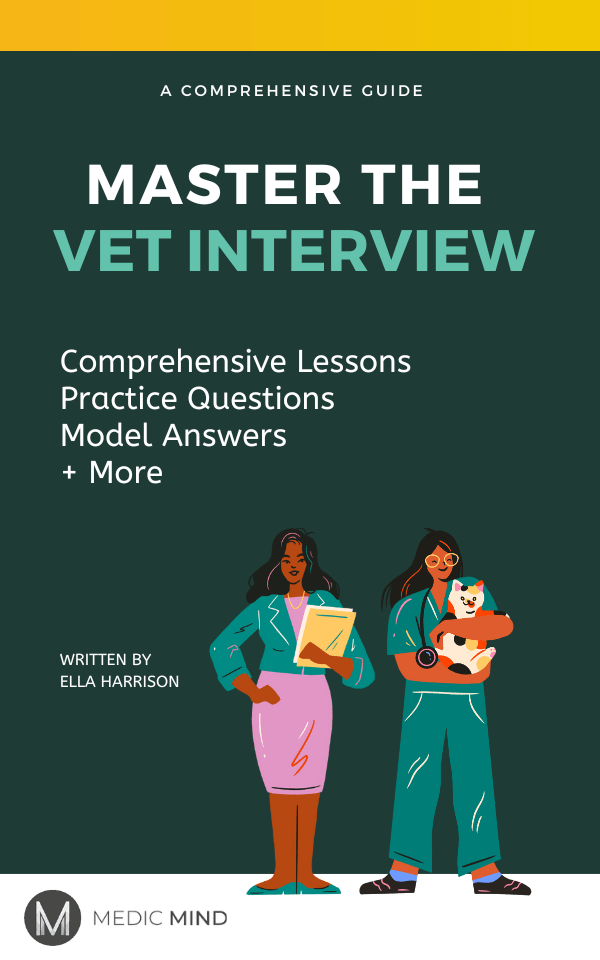Loading...


TOP Veterinary Interview Preparation Questions
So you have an interview invitation for veterinary medicine?
Congratulations! Veterinary medicine is such a competitive process so receiving an invitation to the vet school interview is something to be proud of! Maybe now you are wondering what might happen at your veterinary medicine interview? Or how you should prepare to answer the top veterinary medicine interview questions? Great decision; you’re already on track to smashing your vet school interview.
What are the key vet interview questions that you’re likely to be asked, I hear you say. Each university has a preference on the type of veterinary medicine interview questions that they like to ask, but the overall MMI station themes are:
- Ethics
- Role Play
- Anatomy
- Topical Issues
- Work Experience
The list of interview questions for vet school could go on and on and on! The Association of Veterinary Students gives some really nice examples of specific questions that you might be asked. https://www.avsukireland.co.uk/getting-into-vet-school/
There are thousands of veterinary medicine interview questions that you could be asked, so instead of thinking about the textbook answer for each possibility, have a think about this: What do the interviewer’s want to see from me? What will make the vet school fall in love with me? And the answer to that lies in the question… YOU!
What the examiners are really looking for is to get to know you. To know how you think, to know how you prioritise, to know how you work under pressure. Everything that goes at the interview helps them to get to know you as a person, and the MMI stations are a great way of doing this!
Let’s have a little look at the type of vet interview questions and how you can make the vet school desperate to give you an offer.
Ethics

Ethical stations focus on the challenges that a vet might experience in their day-to-day life. Typical interview questions for vet school focus on euthanasia, financial barriers to treatment and knowing how to deal with tricky clients. Again, the questions for this topic could go on and on and on. In need of an easy fool-proof approach? We’ve got you sorted!
My vet school interview tips for ethics stations
The key to tackling ethical situations is to think about everyone that is affected by the decision made, and when I say everyone, I mean everyone! Think about the owner, the vet, the pet, the consumer, the farmer, the finances, the other staff, the public, the family, other animals- if you can name it, you can talk about it! Showing a wider understanding of who our decisions can affect and why we may or may not choose to act in the way that we do will have you onto a winner.
Role-Play
Understandably, lots of applicants are slightly nervous about this station. The myths surrounding scary actors that shout and cry just aren’t true. The main purpose of this station is to see how you can think about a problem and come up with multiple solutions. Along the way, the actors may challenge you and encourage you to expand your thinking. This is a good sign, such a good sign! By challenging you, the actors are testing you under pressure. They want to see how you respond and can change your thinking, whilst showing a genuine display of empathy and emotion. And if the situation starts to get tricky, this is a great thing!
My vet school interview tips for role play stations
You have been given the opportunity to show yourself off under pressure. Take this opportunity to show how confident you are and show the actors that you do deserve a place on the vet course. Take these stations seriously by getting into character and responding how you imagine a real vet would.
Kickstart your Veterinary Interview Prep!
Anatomy
Some universities like to throw in an anatomy station to test you. This is likely to have been something covered by your A-Level Biology course or it could be something that you have little knowledge about. Revising the basic structure of each organ in the body and how this relates to its function will help you massively. It can also be helpful to look at online X-rays of dogs and cats to try identify simple structures e.g a heart. An important part of this station is to expect to be challenged. Sometimes this may be incorporated into a maths question, to push you a bit further. Some good examples of veterinary maths questions from the University of Nottingham can be found here.
My vet school interview tips for anatomy stations
Please don’t eat an entire degree textbook in the hope to become an anatomist before vet school! What the interviewer’s really want to see here is how you think and come up with new ideas. Accept this as an opportunity to learn. Nobody expects you to be a vet before vet school! And remember, this station also tests how you respond to pressure. The interviewer will ask you questions until you get to something that you don’t know. They are looking to push you and see how you respond.
Lots of students are worried that they will blank and panic. The best way to tackle that on this vet interview station is to talk about what you do know, think about how you can relate that to this scenario, and ask the interviewer to explain the answer if you get it wrong. This shows that you are keen!
Topical Issues
The vet interview question surrounding topical issues doesn’t require a comprehensive, essay-worthy response, but an overview of some of the topical issues relating to veterinary. Focusing on the advantages and disadvantages of all possible options will really help you to secure your offer.
My vet school interview tips for topical issues stations
Adding your opinion once you have weighed up the advantages and disadvantages adds a nice touch to your answer. Common issues spoken about would be the breeding of brachycephalic dogs, veganism and the increase in pet ownership during the COVID 19 pandemic. Prior research will show that you are keen, feel free to mention news articles and statistics you may have come across, but be careful to avoid biased sources. Try to have a balanced approach throughout your response before coming to a justified conclusion.

Work Experience
This is the time for you to shine! Since YOU are being asked the interview questions for vet school, your response must be specific to YOU! Making a diary of all of your work experiences will help you massively in this type of station.
My vet school interview tips for work experience stations
My biggest bit of advice would be to pick a case in veterinary practice that you have seen and to learn it as best as you can. It doesn’t have to be an elaborate or life-threatening case, but something that you have found interesting. Learning about the clinical signs, the diagnostic tests or imaging, the diagnosis itself and the treatment plan will stand you in good stead. But do remember, your work experience must be specific to you.
Perhaps you want more?
Example veterinary medicine interview questions are a great way to get you on your way to receiving your offer. Here are some examples for you to get stuck into…
- Why do you want to do veterinary medicine?
- What aspect of animal welfare attracts you to veterinary medicine?
- What steps have you taken to try to find out whether you really do want to become a vet?
- Why should we give you a place?
- What attributes do you have that will make you a good vet?
- Could you think of a situation where your communication skills made a difference to the outcome of a situation?
- Give an example where you have played an effective role as a team member.
- What makes you a good team leader?
- Veterinary medicine requires a great deal of independent study and organisation. How will you manage it?
- Give an example of a situation where you have made a mistake and how you reacted
- Studying for veterinary medicine is a long and stressful process. What makes you think that you can cope with it?
- You will probably have got high marks throughout school. On this vet course, most marks are awarded as ‘satisfactory’ or not. How will you feel about seeming ‘average’ in this new situation?
- What did you learn from your work experience?
- How did your work experience change your view of veterinary medicine?
- What are the challenges of being a vet?
- Do you believe that euthanasia should be allowed?
- How are farm animals treated differently to pet animals?
- Is it right to cull farm animals that have a slower productivity? (E.g. laying hens that don’t lay eggs anymore)
- What do you know about the badger cull in preventing TB?
- How can vets help prevent the problems associated with brachycephalic breeds?
If you want to practice these with a current vet student, make sure to check out Medic Mind’s Veterinary Interview 1-1 Tutoring below where you can get personalised coaching.
And so…
Interview questions for vet school understandably cause lots of nerves in students for different reasons. The most important thing to remember is that vet interview questions really aren’t scary! I like to think of them as an informal chat, rather than an intense interrogation. Think of this as an opportunity to show each vet school who you are and why you deserve a place on their course. Show your enthusiasm and smile. Your passion and motivation. Show them you.
Frequently Asked Question
→What are some common veterinary interview questions?
Some common veterinary interview questions include:
- Why did you choose a career in veterinary medicine?
- What experience do you have working with animals?
- How do you handle difficult clients or situations?
- What are your strengths and weaknesses as a veterinarian?
- How do you stay up-to-date with the latest developments in veterinary medicine?
→How should I prepare for a veterinary interview?
To prepare for a veterinary interview, you should:
- Research the company and its values
- Review common veterinary interview questions and prepare responses
- Practice answering questions with a friend or family member
- Dress professionally and arrive on time
- Bring copies of your resume and any other relevant materials
→How do I answer the question "Why did you choose a career in veterinary medicine?"
When answering the question “Why did you choose a career in veterinary medicine?” it’s important to be honest and genuine. Talk about your passion for working with animals, your desire to make a difference in their lives, and any personal experiences that inspired you to pursue this career path.
→What is your experience working with animals?
When asked about your experience working with animals, be sure to highlight any relevant work or volunteer experience you have, such as internships at veterinary clinics or animal shelters. If you don’t have much experience, talk about your love for animals and your willingness to learn.
→How do you handle the stress of working in a veterinary clinic?
To answer this question, talk about your coping mechanisms for stress, such as exercise, meditation, or spending time with family and friends. Also, discuss your ability to prioritize self-care and maintain a healthy work-life balance.
→How do you stay up-to-date with the latest developments in veterinary medicine?
To answer this question, talk about any continuing education or professional development opportunities you have pursued, such as attending conferences or taking online courses. Also, discuss your interest in staying current with new research and technologies in the field, and how you integrate this knowledge into your practice.
Related Articles
Related links
MMI interview preparation with our live interactive day and comprehensive feedback
Personalised 1-1 lessons, tailored to your interview preparation
Covering 8 interview topics, with model answers, live MMI analysis and hot topics





Was this article helpful?
Still got a question? Leave a comment
Leave a comment